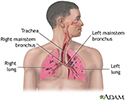Respiratory alkalosis
Alkalosis - respiratoryRespiratory alkalosis is a condition marked by a low level of carbon dioxide in the blood due to breathing excessively.
Causes
Common causes include:
- Anxiety or panic
- Fever
- Overbreathing (hyperventilation)
Hyperventilation
Hyperventilation is rapid and deep breathing. It is also called overbreathing, and it may leave you feeling breathless.
 ImageRead Article Now Book Mark Article
ImageRead Article Now Book Mark Article - Pregnancy (this is normal)
- Pain
-
Tumor
Tumor
A tumor is an abnormal growth of body tissue. Tumors can be cancerous (malignant) or noncancerous (benign).
Read Article Now Book Mark Article - Trauma
-
Severe anemia
Severe anemia
Anemia is a condition in which the body does not have enough healthy red blood cells. Red blood cells provide oxygen to body tissues. Different type...
 ImageRead Article Now Book Mark Article
ImageRead Article Now Book Mark Article - Liver disease
- Central nervous system (brain) abnormalities
- Overdose of certain medicines, such as salicylates, progesterone
Any lung disease that leads to shortness of breath can also cause respiratory alkalosis (such as pulmonary embolism and asthma).
Pulmonary embolism
A pulmonary embolus is a blockage of an artery in the lungs. The most common cause of the blockage is a blood clot.

Asthma
Asthma is a chronic disease that causes the airways of the lungs to swell and narrow. It leads to breathing difficulty such as wheezing, shortness o...

Symptoms
The symptoms may include:
-
Dizziness
Dizziness
Dizziness is a term that is often used to describe 2 different symptoms: lightheadedness and vertigo. Lightheadedness is a feeling that you might fai...
 ImageRead Article Now Book Mark Article
ImageRead Article Now Book Mark Article - Lightheadedness
-
Numbness of the hands and feet
Numbness
Numbness and tingling are abnormal sensations that can occur anywhere in your body, but they are often felt in your fingers, hands, feet, arms, or le...
 ImageRead Article Now Book Mark Article
ImageRead Article Now Book Mark Article - Breathlessness
-
Confusion
Confusion
Confusion is the inability to think as clearly or quickly as you normally do. You may feel disoriented and have difficulty paying attention, remembe...
 ImageRead Article Now Book Mark Article
ImageRead Article Now Book Mark Article - Chest discomfort
Exams and Tests
Your health care provider will perform a physical exam. Tests that may be done include:
- Arterial blood gas, which measures oxygen and carbon dioxide levels in the blood
Blood gas
Blood gases are a measurement of how much oxygen and carbon dioxide are in your blood. They also determine the acidity (pH) of your blood.
 ImageRead Article Now Book Mark Article
ImageRead Article Now Book Mark Article -
Basic metabolic panel
Basic metabolic panel
The basic metabolic panel is a group of blood tests that provides information about your body's metabolism.
 ImageRead Article Now Book Mark Article
ImageRead Article Now Book Mark Article -
Chest x-ray
Chest x-ray
A chest x-ray is an x-ray of the chest, lungs, heart, large arteries, ribs, and diaphragm.
 ImageRead Article Now Book Mark Article
ImageRead Article Now Book Mark Article -
CT scan of the chest
CT scan of the chest
A chest CT (computed tomography) scan is an imaging method that uses x-rays to create cross-sectional pictures of the chest and upper abdomen....
 ImageRead Article Now Book Mark Article
ImageRead Article Now Book Mark Article -
Pulmonary function tests to measure breathing and how well the lungs are functioning
Pulmonary function tests
Pulmonary function tests are a group of tests that measure breathing and how well the lungs are functioning.
 ImageRead Article Now Book Mark Article
ImageRead Article Now Book Mark Article
Treatment
Treatment is aimed at the condition that causes respiratory alkalosis. Breathing into a paper bag -- or using a mask that causes you to re-breathe carbon dioxide -- sometimes helps reduce symptoms when anxiety is the main cause of the condition. However, this method has recently been questioned by experts, especially when there is actual lung disease not just anxiety or a panic attack causing the respiratory alkalosis. Ask your provider what approach is best for you.
Outlook (Prognosis)
The outlook depends on the condition that is causing the respiratory alkalosis.
Possible Complications
Seizures may occur if the alkalosis is extremely severe. This is very rare and more likely to happen if the alkalosis is due to increased ventilation from a breathing machine.
Seizures
A seizure is the physical changes in behavior that occurs during an episode of specific types of abnormal electrical activity in the brain. The term ...

When to Contact a Medical Professional
Contact your provider if you have any symptoms of lung disease, such as long-term (chronic) cough or shortness of breath.
References
McCoin NS, Self WH. Acid-base disorders. In: Walls RM, eds. Rosen's Emergency Medicine: Concepts and Clinical Practice. 10th ed. Philadelphia, PA: Elsevier; 2023:chap 113.
Sanghavi S, Albert TJ. Acid-base balance. In: Broaddus VC, Ernst JD, King TE, et al, eds. Murray and Nadel's Textbook of Respiratory Medicine. 7th ed. Philadelphia, PA: Elsevier; 2022:chap 12.
Seifter JL. Acid-base disorders. In: Goldman L, Cooney KA, eds. Goldman-Cecil Medicine. 27th ed. Philadelphia, PA: Elsevier; 2024:chap 104.
-
Respiratory system - illustration
Air is breathed in through the nasal passageways, travels through the trachea and bronchi to the lungs.
Respiratory system
illustration
Review Date: 8/19/2024
Reviewed By: Allen J. Blaivas, DO, Division of Pulmonary, Critical Care, and Sleep Medicine, VA New Jersey Health Care System, Clinical Assistant Professor, Rutgers New Jersey Medical School, East Orange, NJ. Review provided by VeriMed Healthcare Network. Also reviewed by David C. Dugdale, MD, Medical Director, Brenda Conaway, Editorial Director, and the A.D.A.M. Editorial team.



